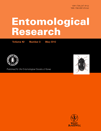
ENTOMOLOGICAL RESEARCH
Scope & Guideline
Advancing Insect Science for a Sustainable Future
Introduction
Aims and Scopes
- Insect Physiology and Development:
Research on the physiological and developmental processes in insects, including studies on gene expression, hormonal regulation, and metabolic pathways that influence growth, reproduction, and survival. - Ecological Interactions:
Exploration of the interactions between insects and their ecosystems, including predator-prey dynamics, mutualistic relationships, and the impact of environmental factors such as climate change on insect populations. - Pest Management and Control Strategies:
Studies focused on integrated pest management (IPM), biological control agents, and the effects of various agricultural practices on pest populations, contributing to sustainable farming practices. - Insect Behavior and Ecology:
Investigations into the behavioral ecology of insects, including mating strategies, foraging behavior, and responses to environmental cues, which are essential for understanding species interactions and ecosystem balance. - Invasive Species and Biodiversity:
Research addressing the impacts of invasive insect species on native ecosystems, biodiversity assessments, and the development of management strategies to mitigate their effects. - Molecular and Genomic Approaches:
Utilization of molecular techniques, including transcriptomics and genomics, to study gene function, resistance mechanisms, and evolutionary adaptations in insect populations.
Trending and Emerging
- Climate Change Impact on Insects:
Increasing studies focus on how climate change affects insect physiology, behavior, and distribution, underscoring the urgency of understanding these impacts for biodiversity conservation and agricultural practices. - Genomic and Molecular Techniques:
There is a growing trend towards utilizing advanced genomic and molecular techniques to investigate insect biology, resistance mechanisms, and evolutionary adaptations, providing deeper insights into insect physiology and ecology. - Insect-Microbe Interactions:
Research exploring the complex relationships between insects and their microbial associates, including gut microbiota and symbiotic relationships, is gaining prominence, reflecting the importance of these interactions in health and disease. - Biological Control and Eco-friendly Approaches:
Emerging interest in biological control methods and eco-friendly pest management strategies is evident, as researchers explore alternative approaches to chemical insecticides, aligning with sustainable agricultural practices. - Behavioral Ecology and Insect Communication:
Increased focus on the behavioral ecology of insects, including communication strategies and responses to environmental stimuli, highlights the significance of behavior in ecological interactions and pest management.
Declining or Waning
- Traditional Chemical Control Methods:
There is a noticeable decrease in research focusing solely on traditional chemical insecticides as pest control methods, likely due to a growing emphasis on integrated pest management and sustainable practices. - General Insect Taxonomy Studies:
Papers focusing on broad taxonomic classifications without specific ecological or applied contexts are less frequent, as researchers increasingly prioritize studies with practical implications for ecosystem management or pest control. - Laboratory-Only Studies:
Research that presents findings solely from controlled laboratory settings without field validation is becoming less common, reflecting a shift towards studies that incorporate real-world applications and ecological relevance. - Static Biodiversity Assessments:
There is a decline in static assessments of insect diversity without subsequent analyses of ecological interactions or functional roles, as the field moves towards understanding the implications of biodiversity for ecosystem services.
Similar Journals
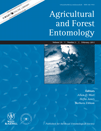
AGRICULTURAL AND FOREST ENTOMOLOGY
Bridging disciplines to enhance biodiversity and sustainability.AGRICULTURAL AND FOREST ENTOMOLOGY is a leading journal published by Wiley, focusing on the interface of entomology, agriculture, and forestry. With a robust impact reflected in its Q2 and Q1 quartile rankings in prominent categories like Agronomy and Crop Science, Forestry, and Insect Science, this journal serves as a vital platform for researchers and professionals seeking to advance their understanding of insect impacts on agricultural and forest ecosystems. Since its inception in 1999, it has provided a comprehensive collection of high-quality research, facilitating interdisciplinary discussions and innovations in pest management, biodiversity, and sustainable practices. Although it does not currently offer Open Access, the journal continues to uphold rigorous peer-review standards, ensuring that published works maintain a profound scientific value. As of 2023, its Scopus rankings further signify its prominence in the field, engaging a global audience keen on addressing the pressing challenges faced within agricultural and forest sciences.
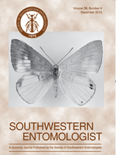
SOUTHWESTERN ENTOMOLOGIST
Exploring the Intersection of Insect Science and AgronomySOUTHWESTERN ENTOMOLOGIST is a pivotal academic journal dedicated to advancing the fields of Agronomy, Ecology, and Insect Science. Published by the SOUTHWESTERN ENTOMOLOGICAL SOC in the United States, this journal plays a crucial role in disseminating vital research findings that address pressing ecological and agricultural challenges. With its ISSN 0147-1724 and E-ISSN 2162-2647, the journal has been publishing comprehensive studies since 1993 and continues to contribute significantly to the knowledge base up to 2024. As a Q4 ranked journal in both Agronomy and Crop Science and Ecology, as well as Insect Science, it provides an inclusive platform for researchers and students to share their insights and foster collaborations. Although it currently does not offer open access options, the content is accessible to academic institutions and professionals, ensuring that significant findings reach a broad audience. Given its niche focus, SOUTHWESTERN ENTOMOLOGIST not only appeals to researchers and students but also to professionals looking to stay updated on the latest trends and developments in entomology and its related fields.
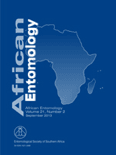
AFRICAN ENTOMOLOGY
Unveiling the Secrets of Insects Across Southern AfricaAFRICAN ENTOMOLOGY, published by the Entomological Society of Southern Africa, is a pivotal journal dedicated to the vibrant field of entomology and its related disciplines. With an ISSN of 1021-3589 and an E-ISSN of 2254-8854, it serves as an essential resource for researchers, professionals, and students interested in the intricacies of insect science across diverse ecological and agricultural landscapes. This journal, with a convergence of publications from 1994 to 2024, holds notable rankings, notably placing in Q2 for Agronomy and Crop Science and Q3 for both Ecology, Evolution, Behavior and Systematics and Insect Science as of 2023. The journal has made significant contributions to the knowledge and understanding of insect populations, their behaviors, and interactions within ecosystems, making it highly relevant for those engaged in agricultural practices and biodiversity conservation. AFRICAN ENTOMOLOGY welcomes original research articles, reviews, and special issues that broaden the dialogue surrounding entomological studies, and while it operates under conventional access policies, it remains an influential platform for scholarly discourse in Southern Africa and beyond.

REVISTA DE LA SOCIEDAD ENTOMOLOGICA ARGENTINA
Bridging Disciplines in the World of InsectsREVISTA DE LA SOCIEDAD ENTOMOLOGICA ARGENTINA is an esteemed open-access journal dedicated to the field of entomology, published by the SOCIEDAD ENTOMOLOGICA ARGENTINA. Since its transition to open access in 2013, the journal has sought to promote research in insect science, ecology, and related disciplines, facilitating global dissemination of knowledge and encouraging collaborative studies across borders. Located in the vibrant scientific landscape of La Plata, Argentina, the journal is indexed in Scopus and categorized in the fourth quartile of ecology and insect science, reflecting its commitment to enhancing the discourse within these critical fields. Aiming to bridge the gap between researchers, students, and professionals, REVISTA DE LA SOCIEDAD ENTOMOLOGICA ARGENTINA serves as a platform for innovative research, reviews, and reports on ecological interactions, behavior, and systematic entomology, ultimately driving forward our understanding of insect biodiversity and its broader environmental impacts.
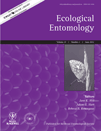
ECOLOGICAL ENTOMOLOGY
Fostering Insights into Ecological Processes and Insect ScienceECOLOGICAL ENTOMOLOGY is a leading peer-reviewed journal published by Wiley, focusing on the dynamic interplay between insects and their environments. With an ISSN of 0307-6946 and an E-ISSN of 1365-2311, this journal has been a pivotal resource in the fields of ecology and insect science since its inception in 1976, and is set to continue until 2024. Recognized for its high academic standards, the journal maintains a prestigious Q1 ranking in both the Ecology and Insect Science categories for 2023, and ranks in the 84th percentile among its peers in agricultural and biological sciences. Although not an Open Access journal, it provides vital insights into ecological processes and insect interactions, making it an essential read for researchers, professionals, and students committed to understanding and conserving biodiversity. The contributions published within its pages significantly advance the knowledge of ecological systems and inform practical approaches to environmental management.

EUROPEAN JOURNAL OF ENTOMOLOGY
Connecting global perspectives in entomological research.The European Journal of Entomology, published by the Czech Academy of Sciences, Institute of Entomology, is a pivotal journal in the field of Insect Science. With a solid impact factor and recognized ranking—placed in the Q2 quartile in 2023, and ranked #72 out of 181—this journal offers a platform for researchers and professionals alike to share insightful studies and advancements in entomological research. Since its inception in 1993, the journal has continuously evolved to cover a wide spectrum of entomological disciplines, establishing itself as an essential resource for academia and industry. Although it operates on a subscription basis, the journal ensures accessibility for a broad audience of scholars, students, and enthusiasts eager to stay at the forefront of entomological science. Located in Ceske Budejovice, Czech Republic, this journal not only highlights European contributions but also embraces global perspectives, making it an indispensable reference point in the ongoing exploration of insect biology and ecology.
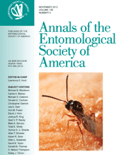
ANNALS OF THE ENTOMOLOGICAL SOCIETY OF AMERICA
Transforming Entomological Research Since 1938ANNALS OF THE ENTOMOLOGICAL SOCIETY OF AMERICA is a premier journal dedicated to advancing the field of insect science, published by Oxford University Press. With an impressive impact factor and classified in the Q1 quartile for its category, this journal ranks among the top publications in agricultural and biological sciences, specifically within insect science, positioned at #28 out of 181, indicating its significant influence and high-quality research contributions. The journal aims to disseminate original research, comprehensive reviews, and groundbreaking findings that enhance our understanding of entomology, spanning across ecological, evolutionary, and applied segments. With a consistent publication history since 1938, researchers, professionals, and students will benefit from the wealth of knowledge presented in its pages. Although the journal does not currently offer open access, it remains a vital resource for those seeking to stay at the forefront of entomological research and innovation.
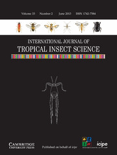
INTERNATIONAL JOURNAL OF TROPICAL INSECT SCIENCE
Exploring the Ecological Impact of Insect DiversityINTERNATIONAL JOURNAL OF TROPICAL INSECT SCIENCE, published by Springer International Publishing AG, is a leading interdisciplinary journal dedicated to advancing knowledge in the fields of insect science and ecology. With its ISSN 1742-7584 and E-ISSN 1742-7592, this journal provides a platform for researchers to publish high-quality, peer-reviewed articles that explore various aspects of tropical insect biology, behavior, and their ecological impacts. As evidenced by its Q3 ranking in both Ecology, Evolution, Behavior and Systematics and Insect Science, it plays a vital role in fostering scientific dialogue and innovation within these disciplines. Researchers affiliated with the journal benefit from its visibility and growing impact, as demonstrated by its Scopus ranks, with a percentile standing of 61st in Insect Science. Although the journal is not open access, it still reaches a wide academic audience, making significant contributions to our understanding of tropical ecosystems. Situated in Switzerland, this journal is crucial for students, professionals, and researchers invested in the intersection of entomology and ecological science.
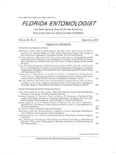
FLORIDA ENTOMOLOGIST
Unraveling the Mysteries of Entomological ResearchFLORIDA ENTOMOLOGIST is a prestigious peer-reviewed journal dedicated to the advancement of entomological sciences, published by Walter de Gruyter GmbH. Since its transition to open access in 1994, the journal has become a vital resource for researchers, students, and professionals in the fields of Insect Science and Ecology, Evolution, Behavior, and Systematics. With an impact factor ranking high in its category—Q2 in Insect Science and Q3 in Ecology, Evolution, Behavior and Systematics—the journal showcases significant findings and contributions that shape our understanding of insect biology and its implications for ecological systems. The journal is indexed in Scopus, further establishing its relevance, with current rankings reflecting its competitive standing within Agricultural and Biological Sciences. Published continuously since 1982, FLORIDA ENTOMOLOGIST not only facilitates the dissemination of knowledge among entomologists but also encourages interdisciplinary collaboration, making it an essential publication for anyone invested in the scientific study of insects.

APPLIED ENTOMOLOGY AND ZOOLOGY
Unlocking the complexities of insect interactions with the environment.Applied Entomology and Zoology, published by Springer Japan KK, is a pivotal journal in the field of insect science, with an impressive track record since its inception in 1966. This esteemed publication, bearing ISSN 0003-6862 and E-ISSN 1347-605X, contributes significantly to the understanding of applied entomology, emphasizing research that supports sustainable agricultural practices and the ecological conservation of insects. Ranked in the Q2 category (2023) for Insect Science with a Scopus rank of #65 out of 181, it is recognized for its rigorous peer-review process and high-quality contributions that push the boundaries of our knowledge. Although it does not currently offer open access, the journal remains an essential resource for researchers, professionals, and students eager to advance their understanding of the complex interactions between insects and their environment. With a focus on practical applications, it aims to bridge the gap between entomological research and real-world implications, fostering innovation and promoting informed decision-making within the scientific community.